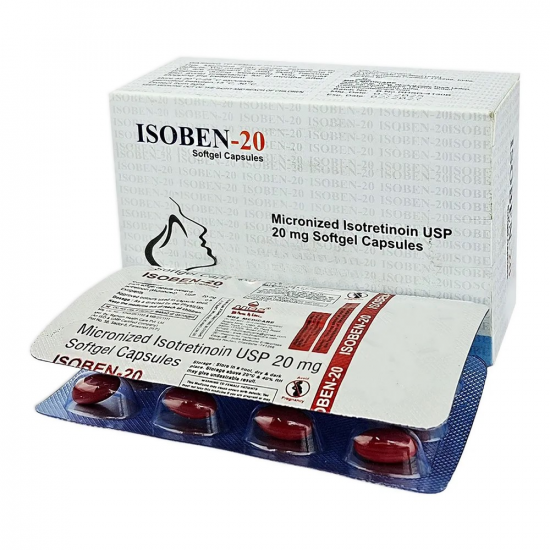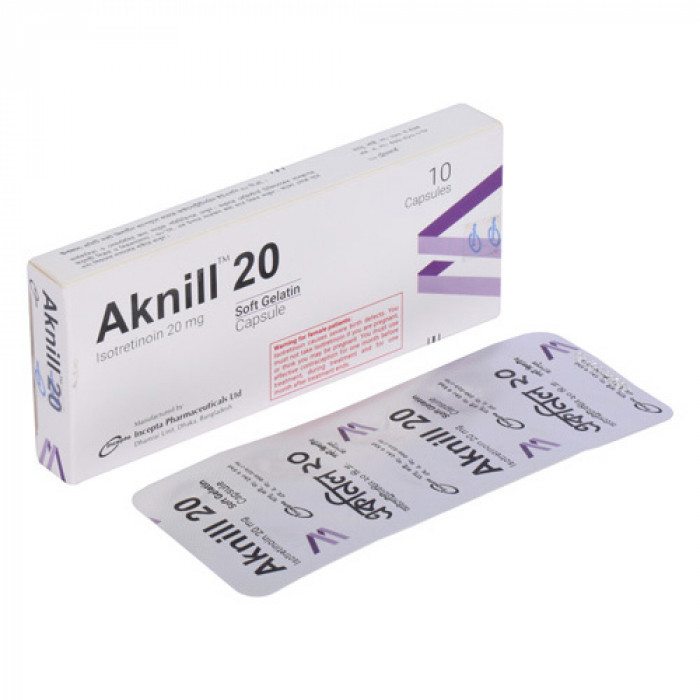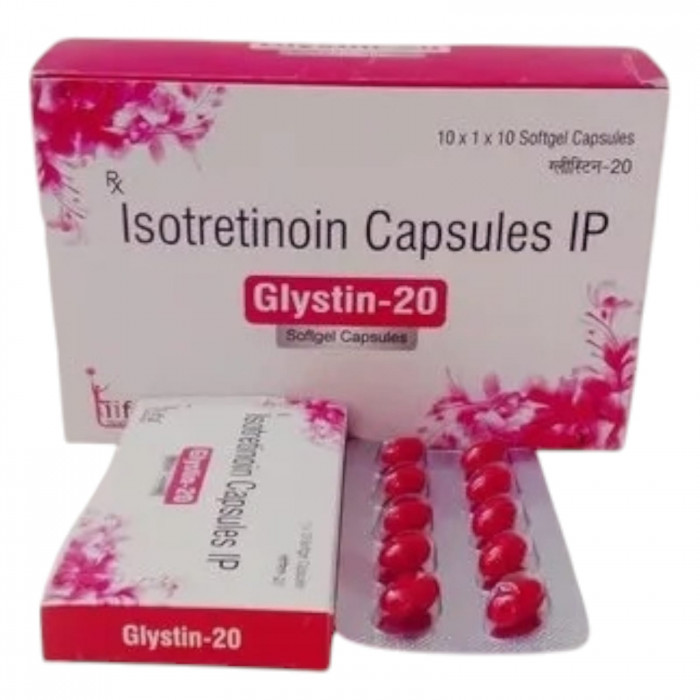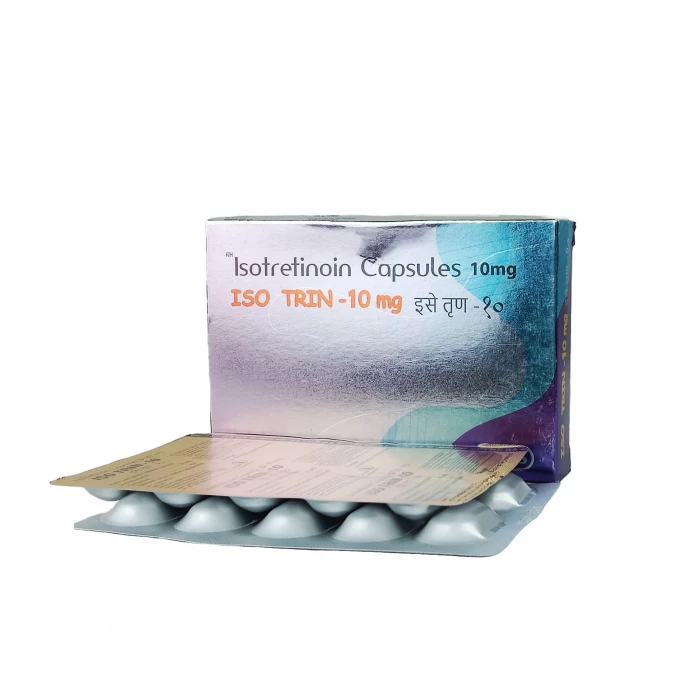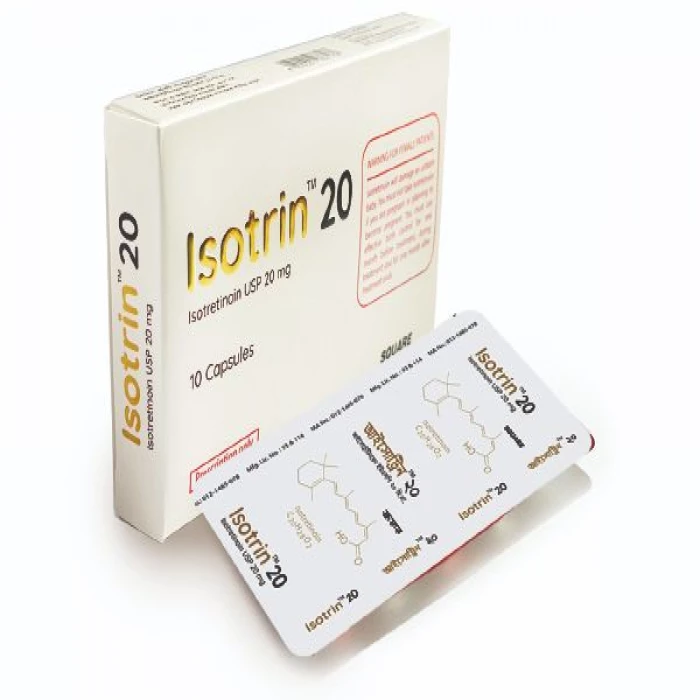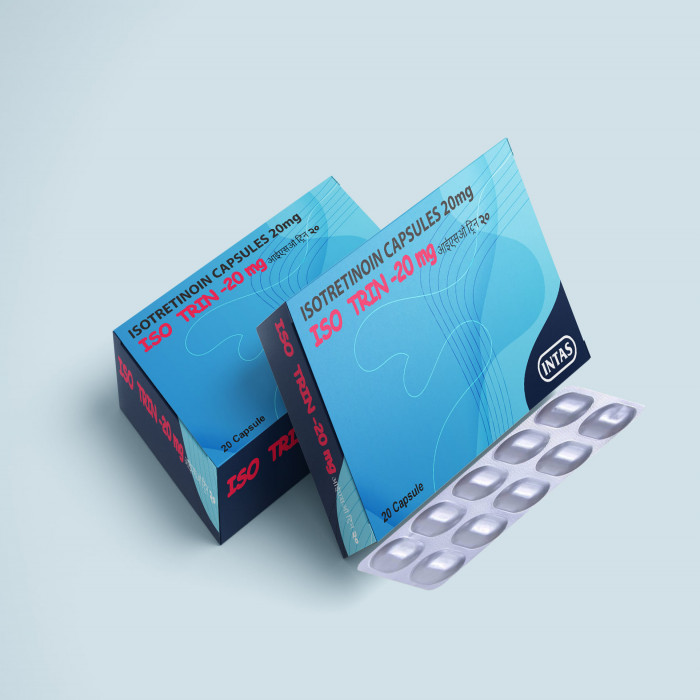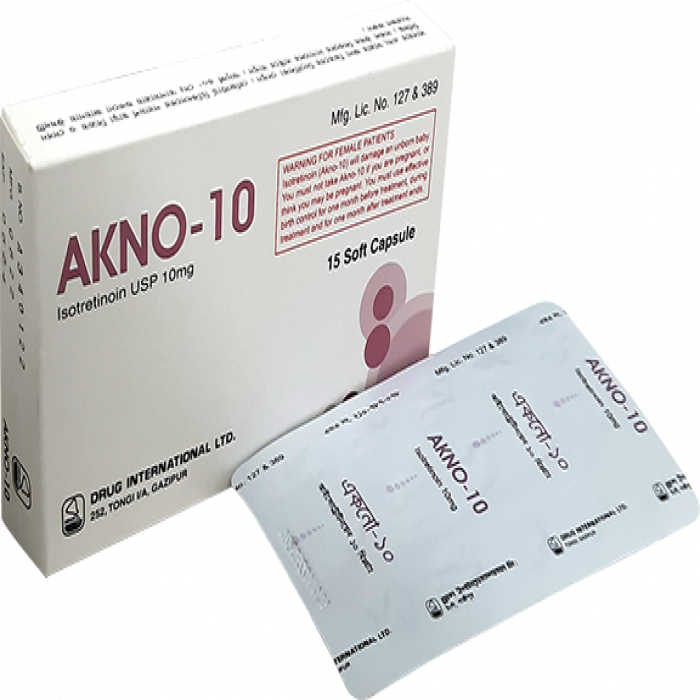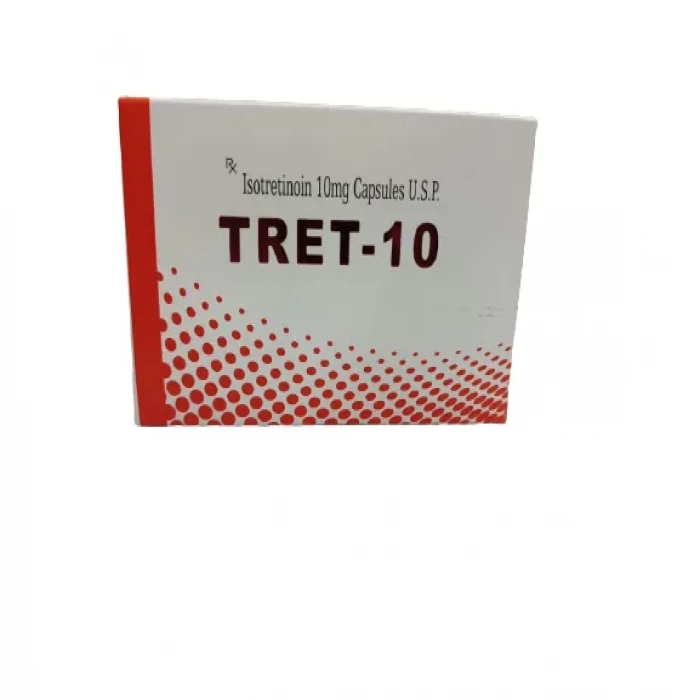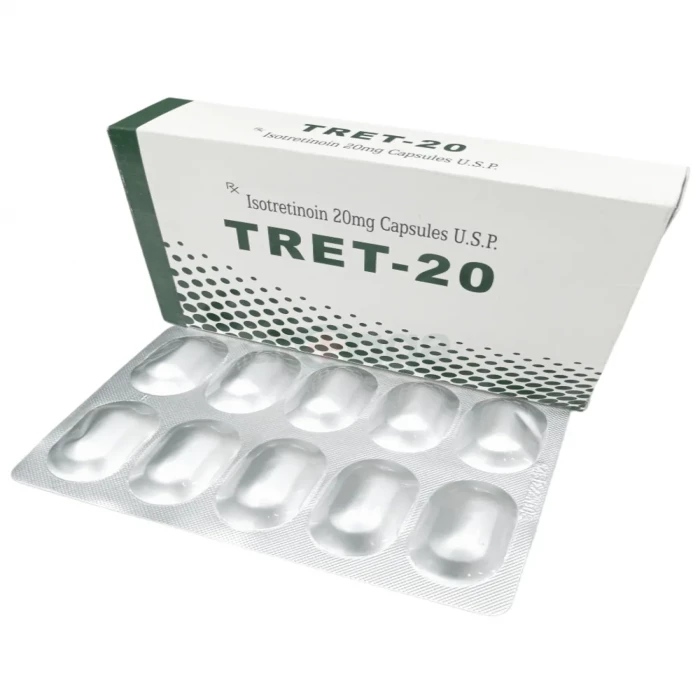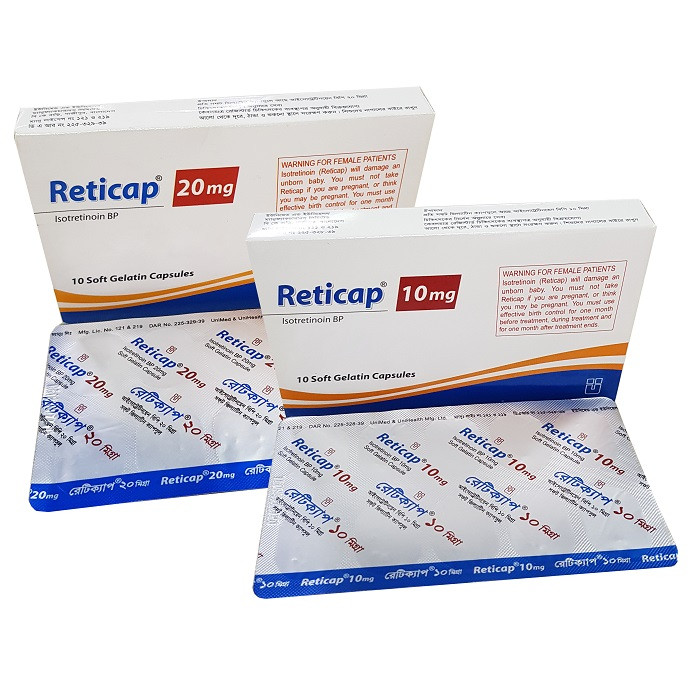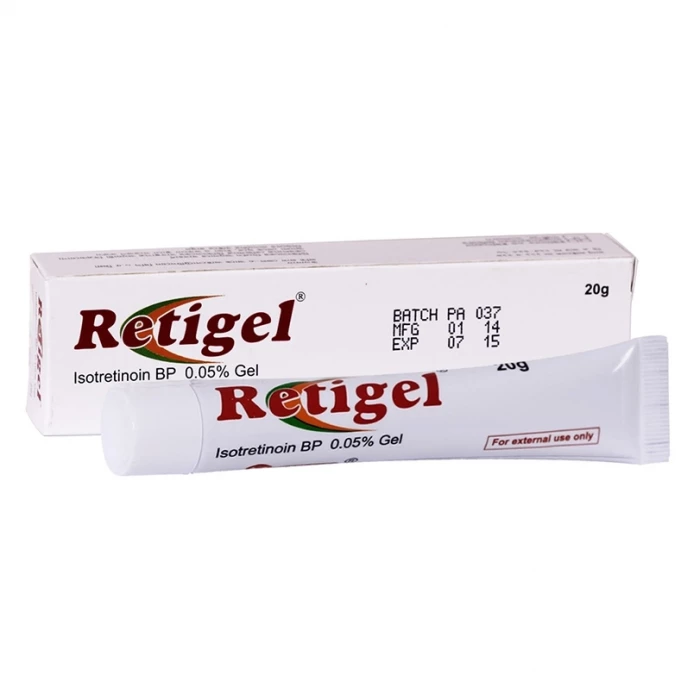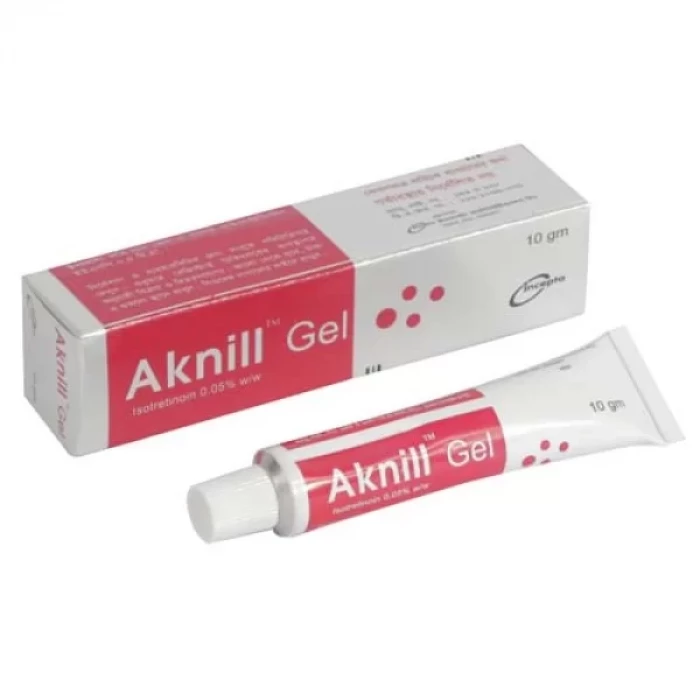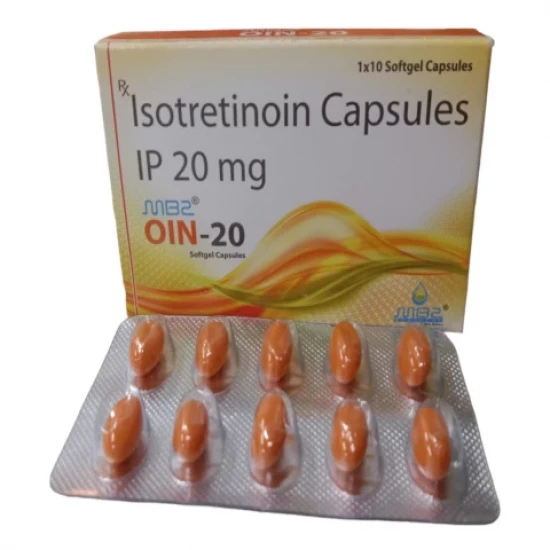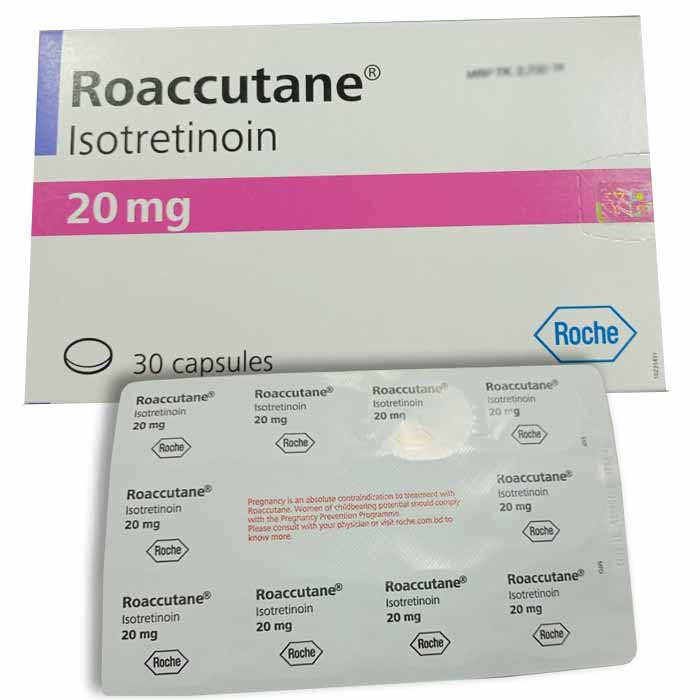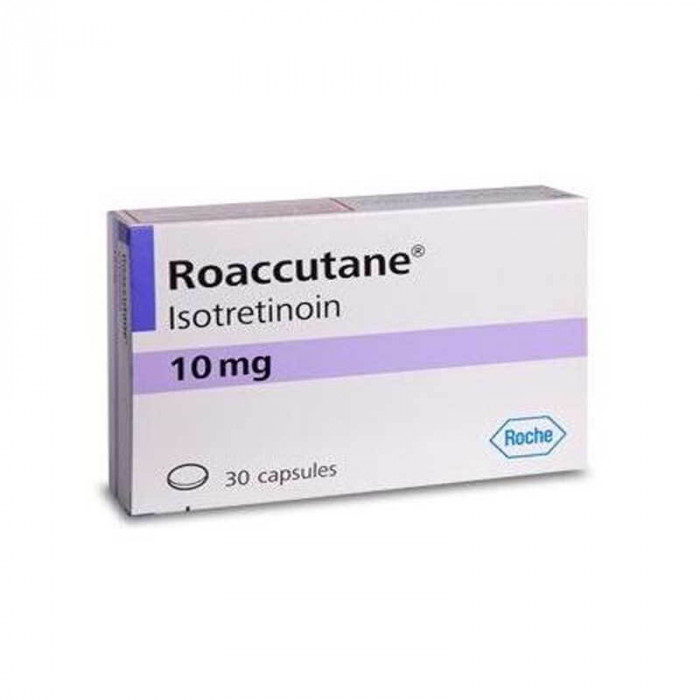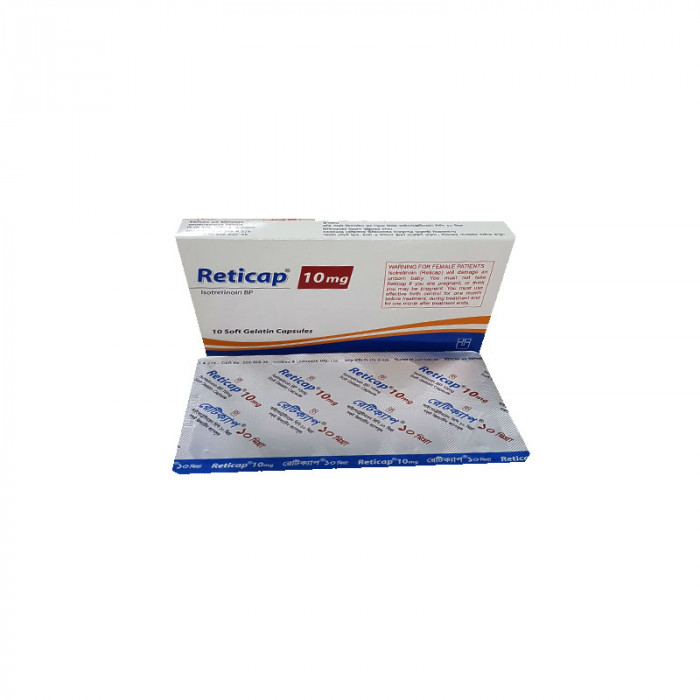
✔ 100% Authentic Product
👁️ Currently Viewing 4054
Reticap 10mg Capsule
- Reticap 10mg Capsule belongs to a group of medicines called retinoids, which are closely related to vitamin A derivatives.
- Reticap 10mg Capsule is used to treat severe acne that has not responded to other treatments.
- Reticap 10mg Capsule should be used in the dose and duration as advised by your doctor.
Discount
Price: ৳ 392
MRP:
৳
400
2%
Off

100% Genuine Products, Guaranteed

Safe & Secure Payments, Always

Fast, Secure & Efficient Delivery

Proper Packaging
 Cash on Delivery - All over Bangladesh
Cash on Delivery - All over Bangladesh Regular Delivery - 12-24 Hours, Dhaka City* Charge Tk.39-59
Regular Delivery - 12-24 Hours, Dhaka City* Charge Tk.39-59 Regular Delivery - 24-48 Hours, Other Cities* Charge Tk.99-110
Regular Delivery - 24-48 Hours, Other Cities* Charge Tk.99-110
 ফ্রি ডেলিভারিঃ - ৯৯৯ টাকা+ অর্ডারে, ঢাকা
শহরে
ফ্রি ডেলিভারিঃ - ৯৯৯ টাকা+ অর্ডারে, ঢাকা
শহরে ফ্রি ডেলিভারিঃ - ২৯৯৯ টাকা+ অর্ডারে, ঢাকার
বাহিরে
ফ্রি ডেলিভারিঃ - ২৯৯৯ টাকা+ অর্ডারে, ঢাকার
বাহিরে
100% Genuine Products, Guaranteed
Safe & Secure Payments, Always
Fast, Secure & Efficient Delivery
Proper Packaging
 Cash on Delivery - All over Bangladesh
Cash on Delivery - All over Bangladesh Regular Delivery - 12-24 Hours, Dhaka City* Charge Tk.39-59
Regular Delivery - 12-24 Hours, Dhaka City* Charge Tk.39-59 Regular Delivery - 24-48 Hours, Other Cities* Charge Tk.99-110
Regular Delivery - 24-48 Hours, Other Cities* Charge Tk.99-110 ফ্রি ডেলিভারিঃ - ৯৯৯ টাকা+ অর্ডারে, ঢাকা
শহরে
ফ্রি ডেলিভারিঃ - ৯৯৯ টাকা+ অর্ডারে, ঢাকা
শহরে ফ্রি ডেলিভারিঃ - ২৯৯৯ টাকা+ অর্ডারে, ঢাকার
বাহিরে
ফ্রি ডেলিভারিঃ - ২৯৯৯ টাকা+ অর্ডারে, ঢাকার
বাহিরে
✅ Description:
Isotretinoin, an ingredient of Reticap, is a member of the Retinoids class of medications. It is used to treat severe forms of acne in adults and kids (who are older than 12) that have not improved after receiving other anti-acne medications, including nodular acne, conglobate acne, and acne that may leave permanent scars. Acne is an inflammatory skin ailment that causes sores, greasy skin, nodular lesions, and other symptoms on the chest, back, and face.
Your doctor may do specific blood tests and pregnancy tests while you are receiving Reticap therapy, and a skin doctor will be watching after you. You will be told to cut back on your vigorous physical activities. Use a high-protection factor sunscreen before going outside in the sun. (SPF 15 or higher).
Safety Advices

Alcohol
CAUTION
Caution is advised when consuming alcohol with Reticap 10. Please consult your doctor.

Pregnancy
UNSAFE
Reticap 10mg Capsule is highly unsafe to use during pregnancy. Seek your doctor's advice as studies on pregnant women and animals have shown significant harmful effects on the developing baby.

Breastfeeding
CONSULT YOUR DOCTOR
Reticap 10mg Capsule is probably unsafe to use during breastfeeding. Limited human data suggests that the drug may pass into the breastmilk and harm the baby.

Driving
UNSAFE
Reticap 10mg Capsule may cause side effects that could affect your ability to drive. Your night vision may get worse during your treatment. This can happen suddenly. Drowsiness and dizziness have been reported very rarely. This may affect your driving ability.

Kidney
SAFE IF PRESCRIBED
Reticap 10mg Capsule is probably safe to use in patients with kidney disease. Limited data suggest that dose adjustment of Reticap 10mg Capsule may not be needed in these patients. Please consult your doctor. If you experience excessive tiredness, puffy eyes, and difficulty in urination while taking this medicine, inform your doctor and stop the therapy.

Liver
UNSAFE
Reticap 10mg Capsule is probably unsafe to use in patients with liver disease and should be avoided. Please consult your doctor
✔️ Uses of Reticap 10mg Capsule
- Treat Acne
✔️ How Does Reticap 10mg Capsule work?
Reticap 10mg Capsule is a derivative of vitamin A. It acts on glands (sebaceous) to reduce the production of a natural substance (sebum) that causes acne. Also, the controlled sebum production kills acne-causing bacteria. It also works as an anti-inflammatory to decrease inflammation (redness and swelling).
✔️ Side Effects of Reticap 10mg Capsule
- Dry lips
- Dry Mouth,
- Minor Swelling of the eyelids or lips
- Crusty Skin
- Nosebleeds
- Upset Stomach
- Thinning of hair may occur
✔️ Quick Suggestions:
- Take Reticap 10mg Capsule with food.
- While using food, stay out of the sun. Use sunblock or wear protective gear as preventative measures.
- While using this medication, stay away from facial waxing and laser therapy since it weakens your skin.
- Avoid taking tetracycline as it may reduce the Reticap 10 activity
- If you are pregnant, planning a pregnancy, or nursing, do not use Reticap 10.
- Reticap 10 could result in dry mouth, lips, and eyes. Use a moisturizer, drink a lot of water, and stay away from using contact lenses. If it affects you, let your doctor know.
✔️ Indication of Reticap 10mg Capsule
Isotretinoin is used to treat severe acne (such as nodular or conglobate acne, or acne that is at risk of scarring) that has failed to respond to adequate courses of systemic antibacterials and topical therapy.
✔️ Pharmacology
Isotretinoin exerts its effects by altering cell cycle progression, cell differentiation, survival, and apoptosis. These actions reduce sebum production, preventing the clogging of pores and the growth of acne-causing bacteria. Isotretinoin and 4oxoisotretinoin both significantly reduce sebum production. Isotretinoin has little or no affinity for retinol-binding proteins (RBPs) and nuclear retinoic acid receptors (RARs). Tretinoin and 4oxotretinoin bind to the RARγ receptor, which is thought to be part of isotretinoin's anti-acne activity. Isotretinoin induces apoptosis in serum cells, resulting in decreased production of sebum. Isotretinoin also reduces acne formation by reducing hyperkeratosis through an unknown mechanism. Isotretinoin does not directly kill bacteria, but it does reduce the size of the sebaceous ducts and make the microenvironment less conducive to acne-causing bacteria. It can also increase the immune mechanism and alter the chemical regulation of monocytes to reduce inflammation.
✔️ Dosage & Administration of Reticap 10mg Capsule
Adults including adolescents and the Elderly:
- Isotretinoin therapy should be started at a dose of 0.5 mg/kg daily. The therapeutic response to Isotretinoin and some of the adverse effects are dose-related and vary between patients.
- This necessitates individual dosage adjustment during therapy. For most patients, the dose ranges from 0.5-1.0 mg/kg per day. Long-term remission and relapse rates are more closely related to the total dose administered than to either duration of treatment or the daily dose.
- It has been shown that no substantial additional benefit is to be expected beyond a cumulative treatment dose of 120-150 mg/kg.
- The duration of treatment will depend on the individual daily dose.
- A treatment course of 16-24 weeks is normally sufficient to achieve remission. In the majority of patients, complete clearing of acne is obtained with a single treatment course.
- In the event of a definite relapse, a further course of Isotretinoin therapy may be considered using the same daily dose and cumulative treatment dose.
- As a further improvement of the acne can be observed up to 8 weeks after discontinuation of treatment, a further course of treatment should not be considered until at least this period has elapsed.
Children:
- Isotretinoin is not indicated for the treatment of prepubertal acne and is not recommended in patients less than 12 years of age due to a lack of data on efficacy and safety.
Patients with intolerance:
- In patients who show severe intolerance to the recommended dose, treatment may be continued at a lower dose with the consequences of a longer therapy duration and a higher risk of relapse. In order to achieve the maximum possible efficacy in these patients the dose should normally be continued at the highest tolerated dose.
Patients with severe renal insufficiency:
- In patients with severe renal insufficiency, treatment should be started at a lower dose (e.g. 10 mg/day). The dose should then be increased up to 1 mg/kg/day or until the patient is receiving the maximum tolerated dose.
✔️ Administrations of Reticap 10 Capsule
The capsules should be taken with food once or twice daily. Isotretinoin should only be prescribed by or under the supervision of physicians with expertise in the use of systemic retinoids for the treatment of severe acne and a full understanding of the risks of Isotretinoin therapy and monitoring requirements.
✔️ Interaction
Additional adverse reactions with vitamin A or its derivatives. The effectiveness of the progesterone microdose is reduced (use 2 methods of contraception). The use of topical keratolytic agents or exfoliating anti-acne agents may increase the risk of local irritation. Oxidizing agents (such as benzoyl peroxide) can reduce the effectiveness of topical isotretinoin.
✔️ Contraindications
Isotretinoin is also contraindicated in patients with impaired liver function, high blood lipids, excessive vitamin A, and tetracycline treatment at the same time.
Isotretinoin is contraindicated in pregnant or lactating women. Unless all the conditions of the pregnancy prevention plan are met, isotretinoin is contraindicated in women of childbearing age. Patients allergic to isotretinoin or any excipient are also prohibited from using isotretinoin.
Unless all of the following conditions of the pregnancy prevention program are met, the drug is contraindicated in women of reproductive potential:
- You have severe acne (such as nodular or combined acne or acne with a risk of permanent scarring).
- Standard treatment includes resistant systemic antimicrobial therapy and local therapy.
- She understands the risks of teratogenicity. Understand the necessity of strict monthly monitoring.
- You understand and accept the need for an effective method of contraception, uninterrupted for 1 month before starting treatment, throughout the treatment period, and 1 month after the end.
- At least one, preferably two complementary methods of contraception should be used, including barrier methods.
- Even if you have amenorrhea, you should follow all recommendations for effective contraception.
- You should be able to comply with effective contraceptive measures. She was informed and understood the possible consequences of the pregnancy and if there was a risk of pregnancy and she needed an immediate consultation.
- She understands the need and accepts pregnancy tests before, during, and 5 weeks after the end of treatment. He admitted that he understands the dangers associated with using isotretinoin and the necessary precautions.
- These conditions also involve women who are currently sexually inactive, unless the prescriber believes there is a compelling reason to show that there is no risk of pregnancy.
- The prescriber must ensure that the patient meets the above conditions to prevent pregnancy, including confirmation that she has a sufficient level of understanding.
- The patient has been admitted to the above situation. The patient used at least one and preferably two effective contraceptive methods, including barrier methods, for at least one month before starting treatment, and continued to use effective contraception throughout the treatment period and for at least one month after treatment. treatment interruption. Negative pregnancy test results were obtained before the end of treatment, during treatment, and within 5 weeks after the end of treatment. The date and results of the pregnancy test should be recorded.
✔️ Pregnancy & Lactation
- Reticap 10 is not recommended for use in pregnant women and women planning a pregnancy. Inform your doctor if you become pregnant during treatment with Reticap 10. It is not recommended to get pregnant for one month after stopping Reticap 10 treatment because some medicine may still be left in your body. Consult your doctor before taking it.
- Contraception must be used for a month before taking Reticap 10, during treatment, and for a month afterward. Discuss with your doctor regarding suitable contraceptive methods.
Breastfeeding
- Reticap 10 is not recommended for use in breastfeeding women as it may pass through breast milk. Consult your doctor before taking it.
✔️ Precautions & Warnings
Before starting treatment:
- To rule out the possibility of pregnancy before starting contraception, it is recommended to carry out an initial medical supervision pregnancy test and record its date and results.
- For patients with irregular menstruation, the timing of the pregnancy test should reflect the patient's sexual activity and should be done approximately 3 weeks after the patient's last unprotected intercourse.
- Prescribers must educate patients about contraception. At the time of isotretinoin prescription or within 3 days before the visit, a doctor-supervised pregnancy test should also be performed during the consultation period and should be postponed until the patient has used a contraceptive method. effective for at least 1 month.
- The test should ensure that the patient is not pregnant when initiating isotretinoin treatment.
Contraception:
- Female patients should be provided with complete information on how to prevent pregnancy.
- If they are not using effective contraception, they should be referred for contraceptive counseling.
- As a minimum requirement, patients at potential risk of pregnancy must use at least one effective contraceptive method.
- It is best for patients to use two complementary methods of contraception, including barrier contraception.
- After stopping isotretinoin treatment, contraception should be continued for at least 1 month, even in patients with amenorrhea.
Pregnancy Test -
- Based on local practice, a physician-supervised pregnancy test with a minimum sensitivity of 25 mIU / ml is recommended in the first 3 days of the menstrual cycle, as shown below.
Follow-up visits:
- A follow-up visit should be arranged every 28 days.
- It should be determined according to local practice whether it is necessary to repeat the pregnancy test every month under the supervision of a doctor, including consideration of the patient’s sexual activity and recent menstrual history (abnormal menstruation, delayed menstruation, or amenorrhea).
- If necessary, a follow-up pregnancy test should be performed on the day of the prescription visit or within 3 days after the prescribing doctor's visit.
End of treatment:
- Five weeks after stopping treatment, the woman must undergo a final pregnancy test to rule out pregnancy.
Restrictions on prescription and dispensing:
- Isotretinoin prescriptions for women of childbearing age should be limited to a 30-day treatment period, and new prescriptions are needed for continued treatment. Ideally, a pregnancy test, prescription, and isotretinoin should be administered on the same day. Isotretinoin should be distributed within a maximum of 7 days after prescription.
Male patients:
- Available data indicate that maternal exposure in the semen of patients treated with isotretinoin is not sufficient to correlate with the teratogenic effects of isotretinoin. Male patients should be reminded not to share medications with anyone, especially women.
Additional Precautions:
- Patients should be instructed not to give this medication to other people and unused capsules should be returned to their pharmacist at the end of treatment. Patients should not donate blood during treatment and within 1 month after stopping isotretinoin, as this represents a potential risk to the fetus of pregnant transfusion recipients.
Eye Diseases:
- Dry eyes, corneal opacity, decreased night vision, and keratitis generally resolve after stopping treatment. A dry eye can be relieved by applying lubricating ointment or using tear replacement therapy.
- Contact lens intolerance may be present, which may require the patient to wear glasses during treatment.
- There are also reports of decreased night vision ability and the onset of some patients is sudden. Isotretinoin may need to be stopped.
Musculoskeletal and Connective Tissue Diseases:
- Patients receiving isotretinoin treatment are reported to have myalgia, arthralgia, and elevated serum creatine phosphokinase.
Mental disorders:
- Isotretinoin-treated patients reportedly have depression, worsening depression, anxiety, aggressive tendencies, mood swings, psychiatric symptoms, and very rare suicidal thoughts, suicide attempts, and suicide. Particular attention should be paid to patients with a history of depression. All patients should be monitored for signs of depression and referred for appropriate treatment if necessary. However, stopping isotretinoin may not be enough to relieve symptoms, so additional mental or psychological evaluation may be required.
Diseases of the Skin and Subcutaneous Tissue:
- Acne exacerbations occasionally occur in the early stage but will subside with continued treatment (usually within 710 days) and generally do not need to be adjusted. Avoid exposure to strong sunlight or ultraviolet rays. When necessary, sunscreen products with a sun protection factor of at least SPF 15 should be used. Patients receiving isotretinoin treatment should avoid severe chemical dermabrasion and skin laser treatment for 56 months after treatment. Discontinue treatment of hypertrophic scars in atypical areas due to risk, and more rarely, inflammatory hyperpigmentation or hypopigmentation in the treated area. Because of the risk of epidermal shedding, patients taking isotretinoin for at least 6 months after treatment should avoid waxing. Avoid administering isotretinoin together with an anti-acne cuticle or topical exfoliant, as this may increase local irritation. Patients should be advised to use skin moisturizers or ointments and lip balm from the beginning of treatment, because isotretinoin may cause dry skin and lips. There have been post-marketing reports of severe skin reactions related to the use of isotretinoin (eg, erythema multiforme (EM), Stevens-Johnson syndrome (SJS), and toxic epidermal necrolysis (TEN)). Since these events are difficult to distinguish from other skin reactions that may occur, patients should be informed of symptoms and signs, and serious skin reactions should be closely monitored. If a serious skin reaction is suspected, isotretinoin treatment should be discontinued. Allergic reactions: There are few reports of allergic reactions, in some cases after previous local exposure to retinoids. Allergic skin reactions are rarely reported. Severe cases of allergic vasculitis have been reported, usually accompanied by extremity purpura (hematoma and erythema) and extracutaneous involvement. Severe allergic reactions require discontinuation of treatment and careful monitoring.
✔️
Keep below 30°C temperature, away from light & moisture. Keep out of the reach of children.
⚠️Disclaimer:
At ePharma, we’re committed to providing accurate and accessible health information. However, all content is intended for informational purposes only and should not replace medical advice from a qualified physician. Please consult your healthcare provider for personalized guidance. We aim to support, not substitute, the doctor-patient relationship.




